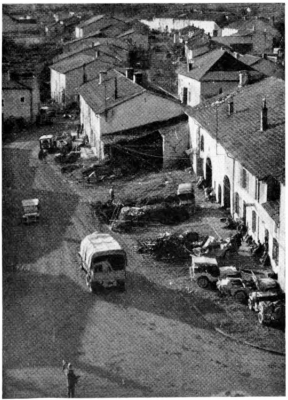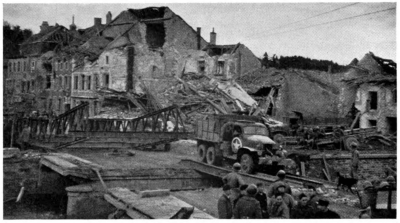|

313ème régiment
d'infanterie américaine - 1944

History of
the 313th infantry in World War II
By Colonel Sterling A. Wood,...
Wadhington Infantry Journal Press - Mars 1947
Chapter 18: The Race to Alsace
As the regime,t moved the division unfolded the plans of
its operation. The attack was to jump off to the east
toward the Saverne Gap. The line of departure was the
Luneville road with the axis of advance being the road
Montigny-Ancerville and to the east. The 314th was to
attack on the left, the 315th on the right, with the
313th Infantry in reserve. The CP of the 313th was
initially to be at Brouville five to six kilometers
northwest of Montigny.
Early in the morning of the 13th the attack jumped off,
and in spite of moderate resistance made steady progress.
The Regiment was directed to protect the flanks of the
attack as it advanced, and this was done by moving the
3d Battalion into the vicinity of St. Pol on the right
flank and the 2d to the east of Magneville. The 1st
Battalion was kept in reserve.
The road junction at Montigny received continuous and
heavy artillery fire, because the Germans realized

A few hours after capture the town of Ancerviller,
France, is "rear echelon" with MP directing traffic
how vital a link it was in our communications. In
addition, St. Pol received heavy artillery fire, as well
as counterattacks from the southeast which jumped off
from the town of St. Maurice.
Company L, reinforced with machine guns and mortars, was
assigned the task of defending St. Pol. The Germans
attacked it continually by day and by night with
infantry and self-propelled guns, their object obviously
being to reach Montigny and cut off our rapidly growing
salient, which by now resembled a long finger pointing
toward our objective, the Saverne Gap.
As the finger lengthened, the thinner were stretched the
2d and 3d Battalions, guarding the left and right flanks
of the Division, respectively. The Germans seemed to
realize this, and their attacks on the right flank
became more determined. After one of these, Company L
counted forty-nine dead Germans in front of their
position, which was the eastern edge of St. Pol.
At this point the French 2d Armored Division, which had
been bivouacked in rear of the 79th, seemed to stir into
action. It was a member of our Corps (the XV), but
little was known of its capabilities or intentions.
Small French task forces began to operate in the
Division area, the bulk of which seemed to concentrate
to the southeast on the Division's right flank. One of
these went to Badonviller and took it from a German
battalion. Another blundered into St. Pol which they
thought was still held by the Germans. One of their
halftracks got into one of Company L's minefields and
had a track blown off, which further convinced them that
they were confronted by the enemy. So they came into St.
Pol shooting, whereupon the Americans took to the
cellars. When the French discovered their mistake they
apologized profusely. No one had been hurt by the
misadventure, and so it was regarded in the light of an
amusing incident by all concerned.
The French forthwith picked another objective and off
they went after it, this time being assured that it was
actually held by Germans.
The Regimental CP had meanwhile moved to Montigny-a hot
spot, as has been said. The 2d Battalion was ordered to
patrol the left flank which seemed ominously quiet. The
1st Battalion which had been in reserve was ordered to
Halloville on November 16, to extend the flank of the 3d
Battalion and to keep contact with the advancing right
flank of the 315th Infantry. Thus, all battalions of the
Regiment were committed, unless you count the 2d
Battalion as being free.
It was not in contact with the enemy in spite of its
extensive patrolling.
On the 16th also, the Regimental CP moved to Ancerviller
which was about halfway to the tip of the
salient from Montigny. The French agreed to take over
St. Pol, allowing the 3d Battalion to assemble
south of Ancerville in Regimental reserve.
Meanwhile the 314th Infantry had advanced as far as
Barbas and on the 16th was attacking that town with its
1st Battalion. The remainder of the 314th had passed on
to the east, so was not in a position to aid in the
capture of Barbas with which the 1st Battalion was
having some trouble. The Division therefore ordered the
CO of the 313th to move his 2d Battalion forward to
relieve the 1st Battalion, 314th, and to take Barbas.
The 2d Battalion was to be relieved from its present
position by the Division Reconnaissance Troop.
Now on this same eventful day at 8:45 P.M., action
flared up again at St. Pol. The French had not yet
arrived, and the 3d Battalion had moved all its units
except Company L into its new assembly area near
Ancerviller.
The Germans attacked with infantry and artillery, and it
was thought that Company L would need additional fire
support. As all the Division artillery had displaced or
was in the act of doing so, the Regimental Cannon
Company then in position in the vicinity of Ancerviller
turned its guns to the rear and fired in the defense of
St. Pol.
The attack was driven off eventually and that flank
quieted down. The French arrived soon thereafter,
enabling Company L to close into the battalion area by
10:15 A.M. on the 17th.
When the 2d Battalion reached Barbas on the morning of
the 17 th they found the 1st Battalion of
the 314th Infantry in possession of the town and
preparing to patrol the ridge to the north that night.
The plan was that if they could take the ridge they
would that night, but our 2d Battalion was to relieve
them wherever they were before daylight.
That night when the 314th patrols explored the ridge
they found no enemy so Lt Col "Tiger" Teague,
the battalion commander, promptly ordered his battalion
to occupy it. This they did but, before the dawn broke
and the 2d Battalion, 313th Infantry, was en route to
relieve them, the enemy infiltrated around the flanks of
the 1st Battalion, 314th, so that not only was relief
impossible but the battalion could not extricate itself.
Therefore an attack by our 2d Battalion was imperative.
The plans were hastily changed and at daylight the
attack swept around the left flank of the 314th's
battalion.
It was a beautiful job in spite of the short time for
preparation. Companies F and G moved out quickly
initially abreast but changing into column order to
avoid heavy mortar and self-propelled-gun fire.
Our own artillery fire and the steady small-arms fire
which was poured into the German positions kept Jerry's
head pretty well down until he was overrun. As the
enemy's hold was loosened on the ridge the 1st Battalion,
314th Infantry, moved out to rejoin the rest of the
Regiment. As the ridge was a long one it was 8:15 A.M.
on the 18th before the objective on the other end, the
Bois du Trion, was reached. There were found some
artillery pieces abandoned by the enemy.
The Regimental CP now moved to Barbas and
plans to take Blamont just the other side of the ridge
began to take shape. The presence of the artillery
pieces in the Bois du Trion coupled with the report of a
heavy explosion at 3:00 a.m. the night before indicated
that the bridge across the stream at the southern
entrance to the city was blown. Company E was ordered to
patrol this area to ascertain this fact, and to contact
the enemy in the town wherever he might be found.
The patrols moved out at 12:30 a.m. and at 12:45 were
seen entering the edge of town apparently without
opposition. At 12:47 radio reports came from the patrols
that the bridge was in truth blown and that no Germans
had as yet been encountered. Later came reports that
twenty-one prisoners were taken without firing a shot
and the town was ours.
The bridge was not repaired until midnight when the
Regiment began to cross immediately. The 2d
Battalion went first as it was scheduled to continue the
attack at 7:00 a.m. It was followed by the 1st, and then
the 3d Battalion, which did not close into Blamont until
9:30 A.M. the next day.
The attack of the 2d Battalion was unopposed and
evidently Corps decided that it was time for the armor,
because at 2: 00 p.m. a message came from the Division
to clear all roads and streets, priority on which had
been given the French 2d Armored Division. This called
for a special effort on the part of the Regiment to get
all its elements across the new bridge, because it had
been found out by experience that if the armor broke
through, trucks would be along to take us along in their
wake, and it was necessary to be ready for this
eventuality.

Blamont fell, and the road to the Alsace Plain was clear.
France. November 20, 1944
The armor roared through Blamont all day while the
infantry laid low and waited. There were the usual
diverting sights such as hair-cutting by the French of
women who had been "collaborating," but the minds of
most of the men were on the future. Was this a real
breakthrough and if it were, how far would it go ? Would
it be like those halycon days of last summer ? Where
would the Germans make a stand-or could they ? How about
the Saverne Gap, the Maginot Line, the Siegfried ? Many
rumors and speculations such as these were voiced
eagerly and the morale of the men rose high.
The Regimental CP had moved into Blamont and at 8:00
o'clock that night Division called and said
the next objective was Saarburg. There was only vague
information on the progress of the French, but it must
have been good because they had cleared Blamont.
At 2:15 P.M. the next day (the 20th) the Regiment was
ordered to move immediately by truck via the
route Richeval-St. Georges, to the area formed by the
triangle: Hattigny-Fragualfind-Niederhof. At 3:10 P.M.
the Regiment moved, led by the 3d Battalion, to which a
company of tanks had been attached. This move was made
without incident and the CP was set up at Niederhof.
[...] |













